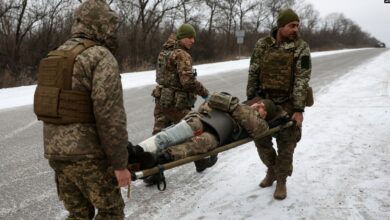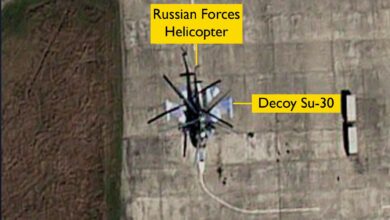
Prepare for a “big-ass fight,” Gen. Joseph Neller told U.S. Marines in Norway in December. His words presaged the new National Defense Strategy, which, for the first time in nearly two decades, warns that “inter-state strategic competition … is now the primary concern” for military planners.
It’s not the first time the U.S. military pivoted from chasing insurgents to squaring off with conventional armies. After the Vietnam War, defense hawks used the threat of the Soviet Union to justify greatly-expanded defense spending. A quarter-century after the last helicopters left the roof of the Saigon embassy in defeat, a high-tech, All-Volunteer Force won one of the most lopsided victories in the history of modern warfare.
That said, the war against the Soviet Union never came. A few months after the ceasefire in the deserts of Southwest Asia, the USSR dissolved. The Cold War was over.
Or so it seemed.
As defense hawks and military planners look again at a resurgent Russia, the threat will undoubtedly be used to justify bigger budgets, better weapons and more troops. Doing so is, of course, worthwhile, as a strong conventional military deterrent in Europe will undoubtedly dissuade Vladimir Putin’s Russia from overtly using military force. But doing so poses a paradox: a credible military deterrent may encourage Russia to achieve its objectives through less-than-war measures, including proxy forces, military contractors, and cyber power – all of which are designed to create plausible deniability and to preclude the U.S. from striking back.
Hackers and trolls: Russia’s online army
Cyberspace may be the primary battleground of the next Cold War. Cyber power allows Russia to undercut America’s advantage in force projection, allowing Russia to strike targets wherever and whenever it chooses. Cyber power also offers Russia an even greater advantage – it’s far less risky than conventional military operations in terms of both physical and political risk. America is also at a loss as to how to respond to Russian cyber operations.
Not only is there no real consensus as to whether a cyber attack warrants a military response, but cyber attacks can be difficult to attribute – witness how Russia tried to frame North Korea for cyber activity during the recent Winter Olympics.
Though much has been made of cyber attacks on critical infrastructure and national defense networks (so-called Digital Pearl Harbors), perhaps an even greater threat comes from state-sponsored hacks of personal email and social media accounts and bank records – none of which rise to the level of military confrontation, but are damaging nonetheless. Russian hackers know that Defense Department networks are relatively well-defended when compared to the personal electronic devices and private accounts of military service members and other government officials.
In 2016, the Russian hacking group Fancy Bear sent phishing emails with malicious links to the Gmail accounts over 300 military and defense officials. Nearly 40 percent of the targets clicked on the links, according to an investigation by the Associated Press. In Eastern Europe, NATO service members reported having their smartphones hacked, with suspected Russian operatives using information on NATO troops to intimidate them in public. And let’s not forget that data collected from fitness trackers highlighted the activities of U.S. troops at bases in Syria and Iraq.
Adding to Russia’s digital malfeasance are the charges leveled by Special Counsel Robert Mueller against 13 Russian citizens and three Russian entities, including the Saint Petersburg-based Internet Research Agency for their role in spreading misinformation.
According to the Special Counsel’s charges, testimony in the U.S. Congress, and the admissions of social media giants, accounts linked to Russia are engaged in ongoing attempts to spread false news and propaganda aimed at furthering the Kremlin’s goals. The internet as we know it may be increasingly contested by Western democracies and authoritarian regimes as each attempts to use the information arena to undermine one another.
Fake news can have real consequences in the West. In 2016, Russia-linked accounts helped mobilize several real-life protests throughout the United States, including both the protesters and counter-protesters at one demonstration in Houston. It is not too far-fetched to suggest that “troll” accounts might even incite violent, perhaps even lethal, protests sometime in the near future.
Red Army in the grey zone
Though cyber power is effective, Russia often needs “boots on the ground” to carry out its dirty work. For that, the Kremlin has increasingly turned towards military contractors and plausibly-deniable Russian troops – the “Little Green Men” who seized Crimea in 2014 to the vehement denial of Vladimir Putin. Since then, Little Green Men have been active in Eastern Ukraine, often wearing sterile uniforms to conceal their ties to Russia.
Russia has also employed armed contractors to carry out military operations in Crimea, Eastern Ukraine, and Syria, according to the Russian news site Fontanka.
Contractors allow Russia to incur casualties without the political consequences which come with uniformed military personnel. The deaths of Russian soldiers are generally disclosed by the Russian government, but not so much with military contractors. Adding to Russia’s deniability is the fact that military contractors are technically illegal in Russia, giving the Russian government all the more reason to find ways to disavow their presence. Wagner, Russia’s equivalent of Academi (formerly Blackwater), is known to have its official headquarters in Argentina, even though they are suspected of having training camps on Russian soil.
Shooting matches involving contractors do not have the same political consequences as those that among uniformed personnel. Just witness the recent clash between American troops and those of the Syrian Democratic Forces against Russian contract troops near Deir Ezzor earlier this month. Though details are still emerging, it appears that Russian contractors in armored vehicles and tanks had the go-ahead from the Kremlin to fire upon U.S. troops. Fortunately, U.S. firepower made quick work of the attackers, with dozens of Russian contractors reportedly killed and no injuries reported among the American and Kurdish contingent.
Normally, such an engagement would be little short of an act of war. Yet, given the unique legal status of the Russian contractors, both sides have, for now, backed down from future military engagement. It is entirely conceivable that small contingents U.S. military forces will continue to find themselves pitted against Russia’s PMCs or Little Green Men in the foreseeable future.
Strengthen the immune system
Like an 8-year-old playing the “I’m not touching you” game, Russia can harass Western interests without risking a military backlash. And while the U.S. must continue to maintain its credible military deterrent against Russian aggression, Western institutions must continue to monitor and guard themselves against so-called “Grey Zone” activities – strengthening cyber defenses, combatting online propaganda and continuing to expose the actions of those operating on Russia’s behalf.
Crispin Burke is a U.S. Army officer. His views are his own and not those of the DOD. Follow him on Twitter at @crispinburke.
All views and opinions expressed in this article are those of the author, and do not necessarily reflect the opinions or positions of The Defense Post.
The Defense Post aims to publish a wide range of high-quality opinion and analysis from a diverse array of people – do you want to send us yours? Click here to submit an Op-Ed.











3 Comments